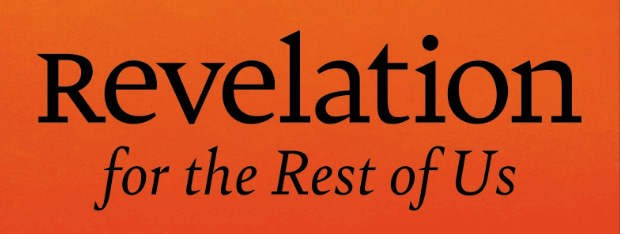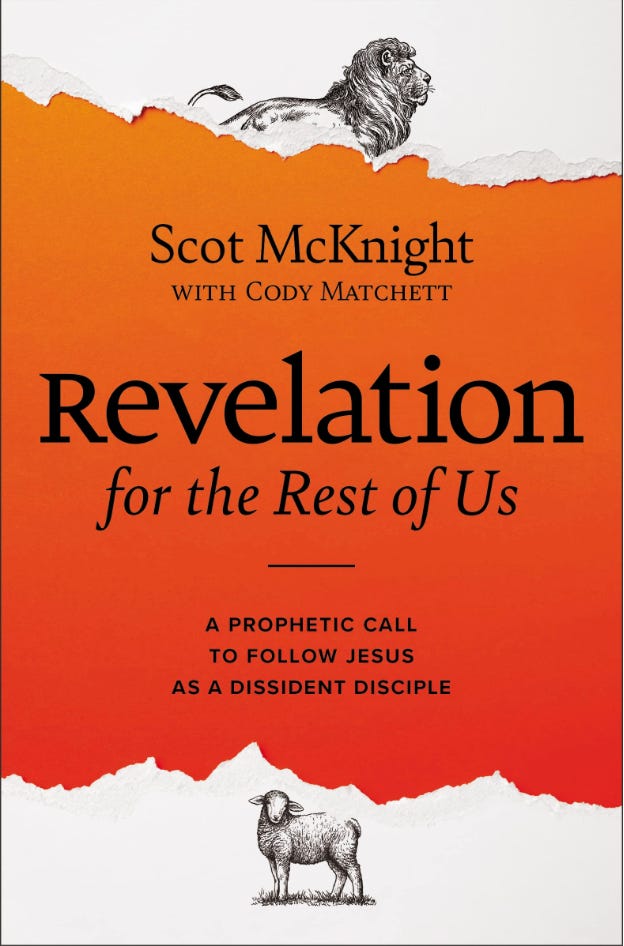Dissidents at Worship
How does one live in a world that is anti-God, devoted to opulence, consistently opposed to Way of Lamb, full of itself and intent on being impressive, protected with the might of its militarism, aiming to become the international power, living on the precipice of constant internal betrayals, driven by economic exploitation of anyone and everyone, structured into a mysterious hierarchical system of power and honor, and at the bottom of it all arrogance its driving ambition? How was one to live “in” Babylon and not be “of” Babylon when boxed in by Babylon? (Empires rise and empires fall, but they’re always present.) Babylon’s reach is deep and wide, as we saw in the previous chapter. But John offers a way for followers of the Lamb to live in Babylon, and it begins with worship.
This post from Cody Matchett’s and my book Revelation for the Rest of Us. If you or your small group or your whole church needs study questions from this book, please go to our website, where you can download a Word file or a colorful PDF.
Remember how Revelation reads: a vision of Jesus Christ and then messages for seven specific First Century churches. John wrote up the entire Apocalypse for those seven churches. The Book of Revelation is not a timeless vision using the seven churches as a mask for some future world, but is instead a timely revelation about Jesus for those churches (and for churches of all times). So, after reading the messages to the seven churches from the Colossus of Christ (Rev 2-3), we are at the cusp of hearing what God is about to do. But that’s not what happens. Instead of a quick take-down of the enemy, we are suddenly swooped up with John into the Throne room of God where twenty-four elders and four living creatures utter praise to God. Instead of judgments leading to the defeat of Babylon, we first encounter cosmic worship. Then we see a vision of the Lamb who is worshiped and announced as the only who is worthy of opening the seals. Only then do we get the seals, the trumpets, and the bowls. Even then, when we watch those three times seven disciplines unrolled, we are constantly interrupted with scenes in heaven, many of which are about worship.
Revelation is about worship, and dissident disciples worship the Lamb.
How does worshiping the Lamb in the midst of empire become dissident worship?
How are the seven churches to live in Babylon? With worship. Too many speculators have failed at the level of understanding the basic discipleship message of Revelation. Their concern is about escaping this so-called final Babylon. What escapes their escaping is the powerful message of dissident discipleship that begins on our knees together worshiping the Lamb as the way of God. I have read too many books about Revelation that ignore discipleship, ignore the centrality of worship, and ignore the theme of dissident discipleship – and spill their ink on speculations about Who and When.
John’s steadies living the Way of the Lamb surrounded by Babylon with worship.
Worship
Before we explain how worship is at the heart for Christian living in Babylon, we call your attention to a growing (healthy) trend among thinkers, namely, the importance of habits for forming character. The official name is “virtue ethics,” and its theory is that, if we practice the right habits – like worship, they will form us into the right persons, and right persons will do the right things in the context of the right story. So: the body’s habits lead to character formation, and good characters do good. Here is James K.A. Smith, who is a well-known advocate of such an approach:
In short, the way to the heart is through the body, and the way into the body is through story. And this is how worship works: Christian formation is a conversion of the imagination effected by the Spirit, who recruits our most fundamental desires by a kind of narrative enchantment – by inviting us narrative animals into a story that seeps into our bones and becomes the orienting background of our being-in-the-world.
Smith gets to the heart of how John is forming the seven churches: story, embodied habits, Spirit of God. He wants them to learn to worship in the context of the Story of Everything and to learn also that embodied worship works into our hearts and forms us into people who walk in the Way of the Lamb. The place of the Spirit must be given more emphasis than the habits themselves. The habits don’t do their work alone. The habits, as Dallas Willard said so many times, make us available to the Spirit and to God’s grace, because it is the Spirit, not the habits, that form us. If the habits did the work by themselves, those who did the habits, and I shall omit names and denominations, would be the most allegiant in the Way of the Lamb.
But many, as Lauren Winner has shown, practice the most important habits – baptism, Lord’s supper, etc. – in a manner that somehow leads not to formation but to de-formation! One of her examples is Christians in medieval Europe storming out of a eucharist service in Holy Week to murder Jews. So, yes, habits matter but only if drenched in the Spirit of God and only if we practice these habits as gratitude for God’s redemption.
The major habit of the Book of Revelation is worship.
Worship changes us.
One of the most interesting writers about Revelation in the last fifty years is Elizabeth Schüssler Fiorenza, and she asked the right question: “What does a reading of Revelation do to someone who submits to its world of vision?”
What, we can now ask more narrowly, does it do to the person who turns constantly to God in worship?
Worship is a whole body, whole voice, whole mind, and whole life lived in gratitude to God for redemption and a whole life surrendered to the Way of the Lamb. The “interruption” of Revelation 4-5 takes us to a scene in the Throne room where the action is worship. John wants his readers to know this one thing: worship of God on the Throne and the Lamb is required to comprehend the three times seven divine disciplines in chapters six through nineteen.




Pardon my long comment but there is so much to chew on here! "How does worshiping the Lamb in the midst of empire become dissident worship?" I love the idea that embodied habits set the stage for this. And how a life of gratitude and surrender is evidence worship is present in someone's life. I have been reading lots of Bonhoeffer and his idea of being fully human and fully unified in Spirit sticks with me. Without surrender or personal sacrifice, without gratitude and excitement about what God is doing, habits will become about us. And without embodied habits, we are not following the Lamb and can easily submit to the empire and neglect to act responsibly when God calls us to do so.
Lately, I have been focusing on "loving myself" so that I can "love God" and "love my neighbor". This means I have been focusing on being healthy, both mentally and physically. This has ABSOLUTELY set the stage for me to be a better listener, less reactive, more helpful and energized when I have the opportunity to meet practical needs. I think most evangelical women struggle with the foundational concept of loving ourselves so I am doing my best to address that in my blog about the 12 steps. Good, sweet church people can easily fall into codependency which can be remedied by the 12 steps (eg. Al Anon). I don't have a lot of readers yet, but I feel that it's important so I keep writing. Maybe that is a form of dissident worship? I sure hope so!
Scot --
Looking forward to reading the book as well. Sadly, the link on the book's webpage to download the questions does not work. :(